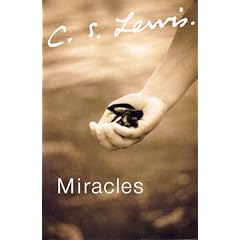
On approaching this book by CS Lewis, I was expecting a thorough discussion of the miracles in the Bible, perhaps even a devotional Bible study. Well, the book is thorough, but not quite in the way I was expecting. What Lewis does is write a book addressed to secular man, arguing deep philosophy to prepare him to examine the biblical accounts of the miracles themselves, rather than discussing them per se.
Given that the book was initially published in 1947, it is written for its time, with the philosophical and social circumstances of the post-war period, and the particular intellectual landscape of the era. As such, some of the arguments now seem to be redundant, or maybe just archaic. It was due to these deep arguments that I sometimes found the book hard going, difficult to read, and hard to keep up with. Maybe it's just that I'm very dense!
Despite this, it was still an interesting read with some great rhetorical flashes from the genius wit of the author of the Chronicles of Narnia. Arguing for the importance of getting the philosophical groundwork right, Lewis declares that 'what we learn from experience depends on the kind of philosophy we bring to experience.' As he initially raises the subject of miracles (with his definition: 'an interference with Nature by a supernatural power'), he introduces the two types of people in the world - Naturalists and Supernaturalists. Naturalists believe that Nature is all that exists, whereas Supernaturalists believe that there is something (or Someone) beyond Nature, outside Nature, existing of its own accord.
Through a long philosophical discussion, he eventually argues that Nature cannot be all that exists, because Reason (our minds) can influence Nature (our bodies), so therefore something supernatural exists beyond Nature. Our Reason cannot be said to have evolved from non-rational causes, because otherwise we could not reason, it just would not be entirely logical. Rather, our consciousness must have come from the great Supernatural One, God who is beyond Nature.
As he moves on to think more specifically about miracles, he raises a red herring sometimes promoted - that people in Bible times accepted the reports of miracles because they didn't know about the Laws of Nature. With great wit, he exposes this for the folly it is, by asking if Saint Joseph really didn't know how babies were produced. After all, this is exactly why he was going to 'repudiate her.'
In thinking further about the Laws of Nature, he helpfully points out that they don't cause events to happen; they only describe what the normal pattern is for events - such as the law of gravity etc. Miracles, while not fitting into the laws of nature, being themselves a disturbance of the laws, feed new events into the pattern which is then assumed and used by Nature herself. His final comment on Nature is particularly apt:
'only Supernaturalists really see Nature (for who she is, not our Creator and the whole show, but just a created being)... Offer her neither worship nor contempt... she, like ourselves, is to be redeemed.'
Finally coming on to his subject proper, Lewis asserts that other religions don't really do miracles in the way that Christianity depends on them. In protesting about a naturalistic reductionistic Christianity, he states that 'Christianity is precisely the story of a great Miracle. A naturalistic Christianity leaves out all that is specifically Christian.' This great Miracle, the Grand Miracle is, for Lewis, the incarnation, and 'every other miracle prepares for this, or exhibits this, or results from this.'
For Lewis, the miracles in the New Testament * are either lies, legends, or history, and it is up to the reader to decide. But if they are merely lies or legends, then the entire credibility of Christianity is at stake - 'Christianity is simply false.'
In a helpful discussion, he asks about the similarities between the 'Corn King' - the god of agriculture, and Jesus - dying and rising. Did Christianity simply take some earlier religious myths and symbols to create its own theology? Jesus 'is like the Corn-King because the Corn-King is derived from the facts of Nature, and the facts of Nature from her Creator; the Death and Rebirth pattern is in her because it was first in Him... The Hebrews throughout their history were being constantly headed off from the worship of Nature-gods; not because the Nature-gods were in all respects unlike the God of Nature but because, at best, they were merely like, and it was the destiny of that nation to be turned away from likenesses to the thing itself.'
In his closing section, on dealing with the miracles of the New Creation, he points forward to the joys of heaven, when things will be even more marvellous than we can now imagine, when all things are set right. In preparation, therefore, we must enjoy our bodies now, as the prelude to heaven's spiritual body where full enjoyment will last forever.
All in all, it's probably a helpful book to prepare the philosophical outsider to consider the miracle accounts in the Gospels, and has some great moments and memorable lines. I'm glad to have read it, but am not sure it would be one I would recommend to many people.
* In a footnote, CS Lewis suggests that the New Testament miracles are more historically viable, but cannot possibly comment on the Old Testament miraculous, such as Jonah and the whale, as it is beyond the scope of his book. I can't say I agree with him on this, and think he depends too much on the mythology which may or may not be historically accurate for his view of the Old Testament.
No comments:
Post a Comment